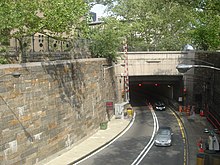Queens-Midtown Tunnel

Manhattan portal
|
|
| Overview | |
|---|---|
| Other name(s) | Queens–Midtown Tunnel |
| Location | Manhattan and Queens, New York |
| Coordinates | 40°44′44″N 73°57′53″W / 40.74556°N 73.96472°WCoordinates: 40°44′44″N 73°57′53″W / 40.74556°N 73.96472°W |
| Route | 4 lanes of |
| Crosses | East River |
| Operation | |
| Opened | November 15, 1940 |
| Operator | MTA Bridges and Tunnels |
| Traffic | 79,063 (2010) |
| Toll | As of March 22, 2015, $8.00 (cash and non-New York State E-ZPass); $5.54 (New York State E-ZPass) |
| Technical | |
| Length | 6,414 feet (1,955 m) |
| No. of lanes | 4 |
| Tunnel clearance | 12 feet 1 inch (3.68 m) |
| Route map | |
The Queens–Midtown Tunnel (sometimes simply known as the Midtown Tunnel) is a highway, tunnel and toll road in New York City. It crosses under the East River and connects the Borough of Queens (at the Long Island City terminus of the Long Island Expressway) on Long Island, with the borough of Manhattan (between the major crosstown thoroughfares of East 34th Street and East 42nd Street in the Midtown Manhattan area). Designed by Ole Singstad, it was opened to traffic on November 15, 1940. The tunnel consists of twin tubes carrying four traffic lanes, and is 6,414 feet (1,955 m) long. It once carried New York State Route 24. The tunnel is owned by New York City and operated by MTA Bridges and Tunnels, an affiliate agency of the Metropolitan Transportation Authority.
When planning began, a bridge was strongly supported by some backers, including Robert Moses, who balked at the increased cost of a tunnel and the fact that it would not be completed in time for the 1939 World's Fair. Manhattan borough president Samuel Levy in particular was a strong backer of a six-lane bridge plan. Commissioner William Friedman of the New York City Tunnel Authority rejected the alternative outright. The Ole Singstad-designed tunnel was opened to traffic on November 15, 1940.
...
Wikipedia

